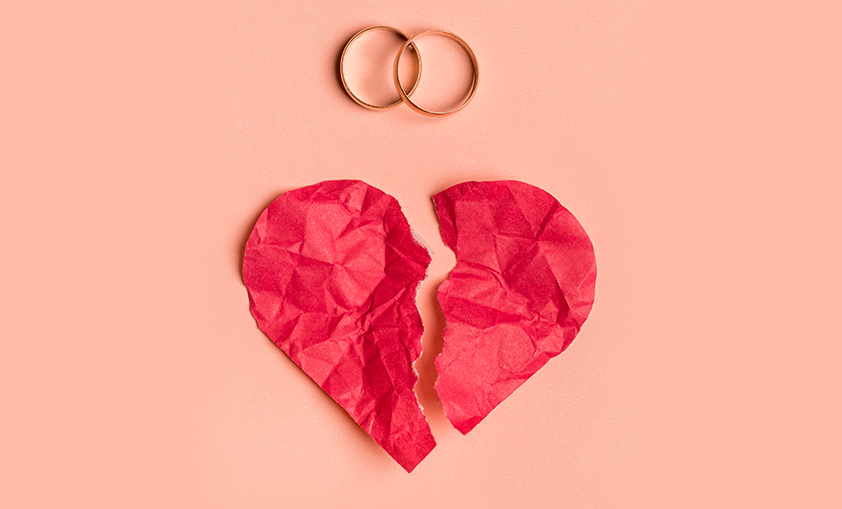When I was a little girl, I remember my mom telling me the story of how she met my dad. My parents were married when they were twenty-three and twenty-five, and I was born when my mom was twenty-five. Somehow growing up, I thought my life would turn out exactly like my mom’s.
However, that was not the case for me.
I got married at twenty-six and by the time I was thirty, I was divorced and going through an annulment. I never thought in my wildest dreams I would be a divorced Catholic.
While I don’t think I will ever be able to say I am grateful for those hard years, I can say with 100% certainty that I’m grateful for what God has taught me through those years. There were hard lessons to learn and absorb. But now I’m a healthier and stronger version of myself.
It has been just over four years since my divorce was finalized. As I look back and think on the many lessons I have learned, there are a handful of principles that have helped me become the woman I am today. If you (or someone close to you!) are a divorced Catholic, I hope you find these encouraging, helpful, and supportive.
1. Go to counseling

I’m a firm believer everyone should go to counseling at some point or another in life. I was already going to counseling regularly while I was still married and continued going after my divorce. I knew I needed extra support as I worked through all the emotions and feelings that came up for me.
In counseling, I had a sounding board for knowing what things I had to work on before I felt ready to start dating again. It gave me a chance to focus on what I was looking for in a healthy relationship. Counseling helped me face what I did wrong in my marriage and take responsibility for my part, while also working through my own baggage and issues.
2. Find a divorce support group

My therapist told me about a church near her offering a divorce support group called Divorce Care. While not a Catholic program, I found the resources, exercises, and support to be of a great benefit for me. There were no Catholic churches near me offering any type of divorce support, so I turned to a local Protestant church.
From this personal experience, I began to offer and develop a divorce ministry at the parish where I work. As it has grown, I see the need and importance of why it matters the Catholic Church doesn’t forget divorced Catholics.
Call your diocesan Marriage or Family Life office and see if any parishes near you are offering a divorce support group. If not, see if another church near you is offering Divorce Care. Find support and encouragement from other Christians navigating the same things you are facing. This was one of the best healing decisions I made as I started to imagine and rebuild a new life for myself.
3. Be patient with your grief

Grief is a process, a journey when going through something difficult like a divorce cannot be rushed. Grief is hard and messy. One moment you feel fine, and the next you are just overcome with intense feelings. It ebbs and flows like the waves of the ocean.
The only way to get through grief is to go through it.
It will not always be this way. But you cannot rush the grieving process. Be gentle an and patient with yourself. Allow yourself the time and space to grieve the loss. It won’t always be this hard, but it will be for a time, so be kind with yourself.
4. Take responsibility for your part

My counselor reminded me early on in my divorce proceedings that taking responsibility for oneself was a sign of growth and maturity. I learned to do this in a whole new way. In doing my healing work during and after my divorce, I knew part of that work was taking responsibility for myself and for what I had done wrong in the marriage.
Relationships take two people to make it work and two people to break it. I was one of those two people. When I began to honestly look at my words, actions, and attitudes, I began to see more clearly the unhealthy ways I contributed to the end of my marriage.
We all have to take responsibility for our past mistakes. When I began to do this in my life, it helped me flourish and grow in new ways.
5. Give yourself time to heal

In the pain of a divorce, one of the common lies is believing that another relationship will ease the pain of loneliness. For Catholics, the best course of action is to wait until you receive an affirmative decision in your annulment case before you consider dating again. This is because you are presumed to be in a valid, sacramental marriage until the Church proves otherwise.
I found that the annulment process gave me time for me to do my deep soul work of healing. Don’t be in a rush to start dating again. When you’re ready to date someday, you want to approach it from a mindset of healing and wholeness, not neediness or insecurity. Work on yourself before getting back out in the dating pool. If we rush our individual healing process, it will cloud our judgment and decisions as we move forward in a new chapter of life.
Don’t rush through your own healing so you can date again. Take the time now, it will only benefit you in the long run. Healing and hope are possible after a divorce. We just need to take the time to do them well.
What are other healing principles that have helped you navigate life after your own divorce?



